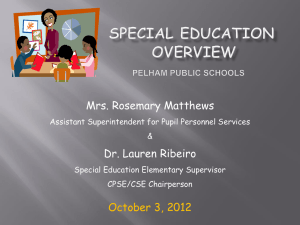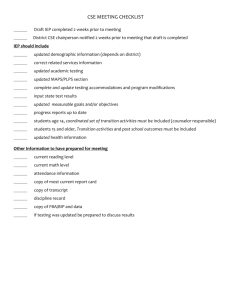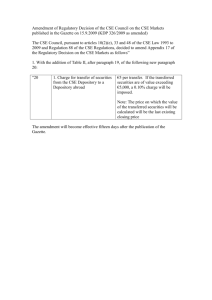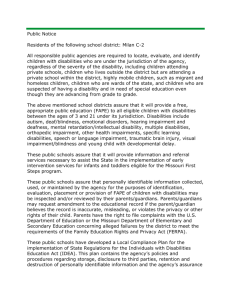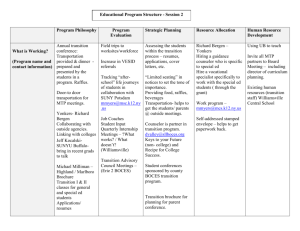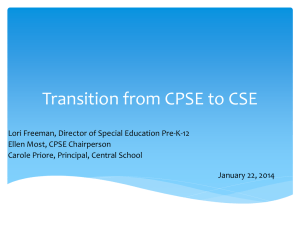0209vesidd4 - New York State Speech
advertisement
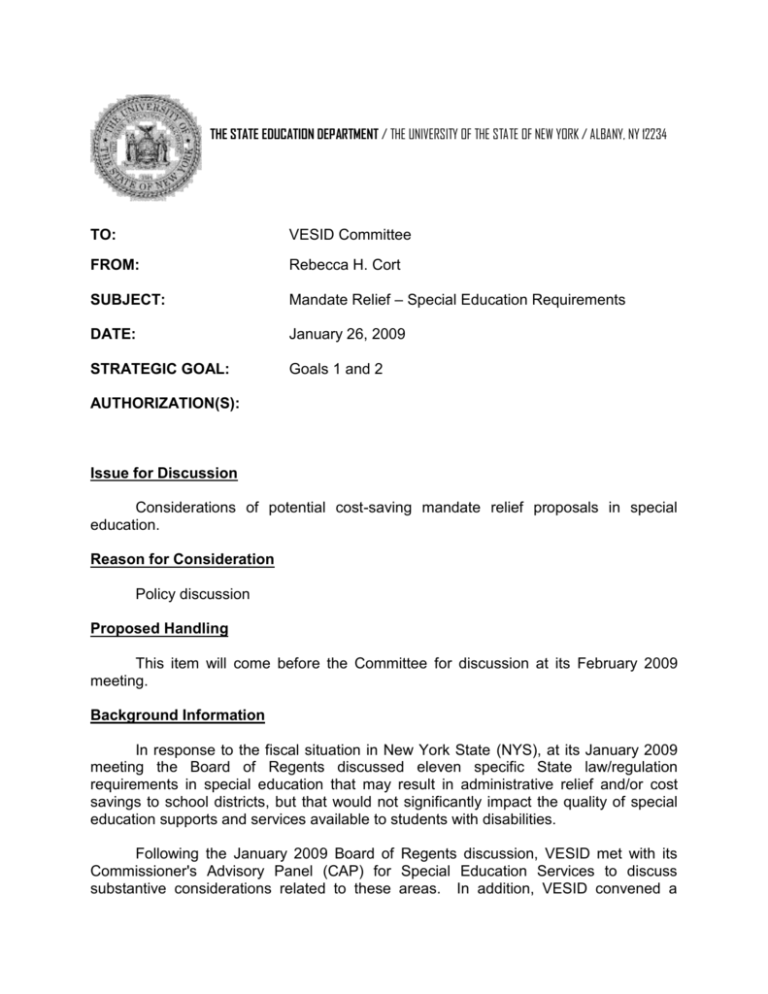
THE STATE EDUCATION DEPARTMENT / THE UNIVERSITY OF THE STATE OF NEW YORK / ALBANY, NY 12234 TO: VESID Committee FROM: Rebecca H. Cort SUBJECT: Mandate Relief – Special Education Requirements DATE: January 26, 2009 STRATEGIC GOAL: Goals 1 and 2 AUTHORIZATION(S): Issue for Discussion Considerations of potential cost-saving mandate relief proposals in special education. Reason for Consideration Policy discussion Proposed Handling This item will come before the Committee for discussion at its February 2009 meeting. Background Information In response to the fiscal situation in New York State (NYS), at its January 2009 meeting the Board of Regents discussed eleven specific State law/regulation requirements in special education that may result in administrative relief and/or cost savings to school districts, but that would not significantly impact the quality of special education supports and services available to students with disabilities. Following the January 2009 Board of Regents discussion, VESID met with its Commissioner's Advisory Panel (CAP) for Special Education Services to discuss substantive considerations related to these areas. In addition, VESID convened a group of stakeholders which included individuals representing the Education Finance Advisory Committee, parents of students with disabilities, professional disability organizations, teachers unions, school superintendents, rural schools, school business officials, special education administrators, school boards and others to discuss the pros and cons of the proposed mandate relief and to consider other ideas for mandate relief in special education raised at this meeting. VESID also reviewed written comment submitted by numerous stakeholder groups with regard to each of the eleven proposed mandate relief areas. Based on this information, VESID proposes the following five areas for further consideration by the Regents: 1. Minimum Level of Service Requirement for Speech and Language Related Services Current requirements: State regulations require that each student requiring speech and language as a related service must be provided a minimum of two 30-minute sessions each week. Proposal Require that each student needing speech and language related services must be provided a minimum of two 30-minute sessions per week when such student is recommended to receive related services only; and repeal the minimum level of service requirement for speech and language as a related service for students where other special education services (besides related services) are recommended for the student. Reason for Recommendation: VESID heard concerns that the current State requirements that students receive a minimum level of service may be limiting discretion of the Committee on Special Education (CSE) and Committee on Preschool Special Education (CPSE) to determine the level of speech and language related services each individual student needs. The determination of frequency and duration of a related service should be based on a student's disability and in consideration of other specially designed instruction the student is receiving through such services as consultant teacher, resource room and special classes. In some cases, some students may be receiving more services than are necessary. While some expressed the need for discretion for the CSE to determine if an individual student needs less than the 2-30 minute sessions per week, others were concerned that fiscal decisions or availability of providers may drive recommendations for frequency and duration of services. Others noted that since speech and language impairment is a disability category for special education services, more students with milder impairments may be determined to need special education solely to receive speech and language. The 2 current minimum level of service requirement provides an important distinction between special education and speech and language improvement services. The above proposal balances these concerns by providing flexibility to the CSE to determine the frequency and duration of speech and language therapy an individual student may need, in consideration of other special education services the student is receiving; and by establishing the threshold of need a student must present to require special education services to address a speech and language impairment disability. 2. Membership of the CSE and CPSE Current requirement: Federal law establishes the required membership of IEP teams. However, State law also requires that an additional parent member of a student with a disability residing in the school district or a neighboring school district be a mandated member of the CSE and CPSE. Such parent is not a required member if the parents of the student request that the additional parent member not participate in the meeting. Proposal Propose that the participation of the parent of a student with a disability (in addition to the parent of the student being discussed at the meeting) be a required member on the Committee on Special Education (CSE) and Committee on Preschool Special Education (CPSE) for initial referrals to special education and, for subsequent meetings, only upon the written request of the parent at least 72 hours prior to the scheduled meeting. Reason for Recommendation: The participation of the additional parent was first enacted in NYS at a time when the federal law did not include the provision that the parent could bring other individuals to the IEP meeting. Ensuring that a parent of another student with a disability is available to participate in CSE/CPSE meetings has presented many challenges to school districts. These challenges were addressed somewhat by changes to State law a few years ago allowing the parent to decline the additional parent member's participation and allowing school districts to use parents from neighboring school districts or parents of students with disabilities who had graduated within five years. While the additional parent members cannot be compensated for their participation on the CSE/CPSE, school districts do incur related administrative costs to ensure additional parent member participation and training. The lack of availability of the additional parent member can result in difficulty meeting mandated timelines for required meetings and possible due process challenges. 3 VESID heard concerns on behalf of parents that, particularly for initial meetings with the CSE and CPSE when they are new to the system of special education, the additional parent member may be an essential support and resource for information for the parent. School districts expressed the ongoing concerns about lack of availability of parent volunteers to serve as additional parent members and the resulting consequences for districts to continuously reschedule CSE/CPSE meetings to meet the additional parent member requirement, sometimes resulting in fiscal consequences when meetings need to be cancelled because of the unavailability of the additional parent member when substitute teachers were hired to cover classrooms for these meetings. 3. Special Education Space Planning Requirements Current Requirement: Education Law requires that each Board of Cooperative Educational Services (BOCES) submit a special education space requirements plan every five years. Proposal: Repeal the requirement for the five-year Special Education Space Requirements Plans, beginning with the next plan due to the Department, but retain the requirement that school districts and BOCES ensure the stability and continuity of program placements for students with disabilities, including procedures that ensure that special education programs and services located in appropriate facilities will not be relocated without adequate consideration of the needs of participating students with disabilities. Reason for Recommendation: This regional planning requirement has been effective in providing for appropriate educational space for students with disabilities in the least restrictive environment (LRE). Subsequent to the initiation of this requirement, the reauthorized IDEA instituted a range of data submissions that each state must include in the State Performance Plan (SPP). As a result, the State collects and publicly reports on each school district's LRE placements for students with disabilities in relation to the State's targets. These SPP requirements can ensure that each school district provides appropriate educational space for students with disabilities in the least restrictive environment, which is the intended purpose of special education space planning requirements. VESID heard agreement that the LRE placements of students with disabilities could be addressed through other processes. However, concerns were highlighted that safeguards should be maintained that protect the stability and continuity of program placements for students with disabilities, particularly when such placements are in BOCES programs in public school district buildings. 4 4. Parental Consent for July/August Services Current Requirement: Federal regulations require that parental consent be obtained prior to an evaluation or reevaluation of a student suspected of having a disability and prior to the first time a child is provided special education services. In NYS, written parental consent is also required prior to initial provision of special education services in a 12-month special service and/or program (i.e., July/August services). Proposal: Propose repeal of the requirement that school districts obtain the written consent of the parent prior to the initial placement of the student in a July/August program recommended by the CSE or CPSE to prevent substantial regression even when consent for initial 10-month special education services has already been obtained. Reason for Recommendation: Minimizing the instances when consent from parents must be obtained would provide some relief from procedural compliance requirements. Parental consent will continue to be required whenever July/August services are recommended at the time the student first receives special education. Currently, parental consent is not required for any subsequent amendment of an IEP, other than the addition of July/August services. Such an amendment can only be made through the CSE/CPSE process, or through an agreement between the parent and a representative of the local educational agency after the CSE or CPSE has reviewed the student's IEP for the school year. If the parent disagrees with a CSE/CPSE recommendation to add July/August services, he or she has the right to challenge such a recommendation through a due process complaint. Requiring school districts to obtain parental consent for the initiation of July/August services adds an additional procedural requirement that is unnecessary under federal law and can be burdensome for school districts, particularly in situations in which the parent is difficult to contact or fails to respond. Few objections were raised to repeal of this requirement, other than generalized concerns that existing requirements for parental consent not be changed. 5. Due Process Statute of Limitations Current Requirement: Education law was amended in 2005 to establish a two-year statute of limitations for filing an impartial hearing request. 5 Proposal: Amend State law to require that an impartial hearing be commenced within one year of the date on which the parent or public agency knew or should have known about the action that forms the basis for the complaint. The time limitation would not apply if the parent is prevented from requesting an impartial hearing due to specific misrepresentations by a school district or the district’s withholding of information it was required to provide under federal law. Reason for Recommendation: Prior to 2005, NYS required that an impartial hearing be commenced within one year of the date on which the parent or public agency knew or should have known about the action that forms the basis for the complaint. The effect of a two-year statute of limitations has been to double the amount of time for a party to bring a complaint, thereby increasing the complexity of impartial hearings and imposing substantial additional due process costs on school districts and the State. Requests for impartial hearings, in particular for claims for tuition reimbursement or compensatory education, have increased since 2005. In addition, a statute of limitations of more than one year to request an impartial hearing is programmatically inappropriate since IEPs are developed for one year. IDEA due process procedures should be designed to resolve disputes within one year so that any resulting changes needed to assure that the student receives a free appropriate public education are made in time to benefit the student. VESID heard concerns that the requests for due process hearings may increase if the statute of limitations were one year, in part because parents may not try to resolve the dispute with the district prior to requesting a hearing. Others supported this change which would lead to issues impacting a child's education to be addressed quickly and during the year the IEP in dispute is in effect. Next Steps: With your direction, VESID will develop legislative/regulatory proposals, and seek public comment as required by IDEA, to provide mandate relief to school districts. 6
